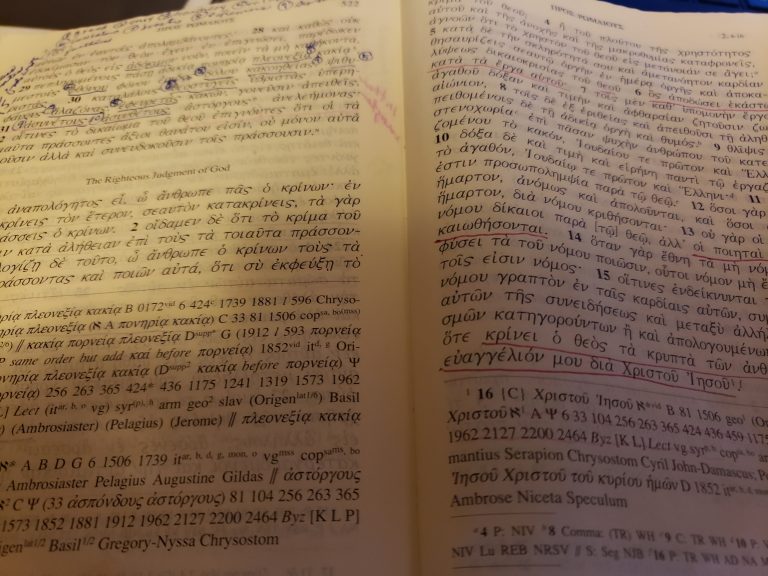Above and Below: Thoughts on Exodus 32
Yesterday I taught the Sunday School lesson for my class. The primary scripture was Exodus 32, the story of the golden calf. Our Adult Bible Studies title for the lesson was “The Permission Trap” and the goal was “To recognize the consequences of giving ourselves permission to do that which we know to be wrong.”
In one sense, one can’t argue with that. The Israelites knew they shouldn’t be making an idol, and that is precisely what happened, Aaron’s claim to miraculous sourcing notwithstanding. (Have you ever thought, “I know nobody is going to believe this, but I need some excuse”?) The Israelites did sin, and there were consequences for their sin.
The question in my mind as I read the lesson was whether this is actually the intended message. No, let me be honest here. I pretty much disagreed with that as the primary message.
It’s quite possible for something to be true on one level and to miss the mark when one goes deeper. The point here is not to say that making calves is OK, but rather that the message is somewhat deeper than “Remember not to make golden calves.” When interpreting stories, I would suggest that finding the moral (or a moral) of the story is not the point at which you have found the meaning. In fact, finding that moral can often prevent you from truly learning from the story.
To lead into this, let me note one Christian reaction, which is to blame the Israelites for being so faithless while imagining that we would do better. I would imagine that people who think this way have either spent very little time in the wilderness, or even in campsites, or they have ignored their own behavior. People who get away from their normal source of food and other supplies tend to get nervous. So the idea that the Israelites were faithless while we would be faithful involves looking at our own characters through rose-colored glasses.
That rosy view of our own characters also results from seeing only the surface problem. We cannot imagine ourselves constructing a golden calf and then dancing around it. We think we could avoid that. Unfortunately, our idolatry often takes less work-intensive forms.
To lead in from another direction (anything to avoid getting to the subject!), let me note that I read from Brevard Childs’ commentary on Exodus. Childs is one of my favorite commentaries, up in the top three. He goes through some of the source and redaction critical ideas on the chapter and does an excellent job as always. He points to some critical aspects of what the chapter teaches based on some of the “problems” certain people have noted in the text.
In an aside about the aside, Childs is a foremost, if not the foremost, advocate of canonical criticism. Canonical criticism involves seeing a passage as part of the whole canon of scripture. By nature, it can make a text look different depending on your religious tradition and view of the canon. For example, Jewish and Roman Catholic interpreters are working from a different canon of scripture than one another and than protestants. I would say that Jacob Milgrom does the best job of seeing the canonical picture from different perspectives. His own perspective is that of a conservative Rabbi, but he looks at usage and interpretation in other traditions.
In practice, scripture comes to us a part of a canon, whether that is the canon of our religious tradition or perhaps of our own making. We will read differently based on the setting in which we place the book. I will read a passage differently myself if I’m trying to understand Israel as an ancient near eastern people, Judaism as a faith, Christianity, or simply looking at a document as a piece of literature. I think we do well to be aware of all of those and I personally don’t privilege one or another point of view. (I would comment Edward W. H. Vick’s book From Inspiration to Understanding: Reading the Bible Seriously and Faithfully on this topic, particularly section 2, Canon.)
For my Sunday School class, I looked from the canonical view, and that leads me to think that the calf itself was an instance, a symptom, and not the underlying problem. I think the text is arranged to emphasize that.
Note, for example, that after we have the introductory story we begin and end dealing with the results on the mountain. In verse seven, YHWH tells Moses about the peoples’ failure. The conversation between YHWH and Moses goes on through verse 14, at which point YHWH repents (more on this in a moment). In verse 31 Moses returns to the mountain for a conversation about the same topic again.
The thinking on the mountain and the thinking at the foot of the mountain are quite different. The people are impatient with God’s timing. Moses doesn’t seem to realize that so much time has passed. This is a good place to put yourself in the shoes of the people at the foot of the mountain. Supposing you are climbing a mountain with a guide. The guide tells you to wait in the based camp while he goes away for some purpose. It could be supplies. It could be information. It doesn’t matter. If the guide doesn’t return in good time, what do you do?
Consider that you have no way of knowing where the guide is. He might have fallen over a cliff. He might have been killed by a wild animal. He might even have gotten lost. If any of those things occurred, and you keep waiting in camp, you could wait until you die. How long do you wait before you move out and try to save yourself? Your life could depend on accuracy.
Yet the meeting on the mountaintop moves at its own pace and the Israelites have to wonder. It’s Moses who has done everything. (We can remember, from the comfort of our easy chairs, that Moses was the agent of God’s action, but to the people, it looks like Moses.) Moses met with Pharaoh and announced the plagues. Moses stretched out his rod over the Red Sea. Moses announced the Manna. Moses struck the rock and brought water. And now Moses is gone.
Be honest! How long do you wait?
Moses hears what God has to say, and God proposes destroying the people. I don’t want to go into detail about this conversation, except to note that this is often the time when we get into debates about foreknowledge, predestination, and whether God can repent. I would suggest those debates don’t go well in this story. Let the story be the story.
Consider: If God is at least as intelligent as an ordinary human, don’t you think he’d know what reaction Moses would have at this point? We don’t have to settle issues of theology and philosophy to understand that God is making a point, and that the storyteller is making points about God and about Moses. Even a God without foreknowledge would know the outcome of this conversation.
We make this point of God’s faithfulness before we hear about what Moses did in the camp. There are consequences and results of my actions, yet neither my actions nor those consequences cause God to be unfaithful. This is stated before Moses goes down to deal with the people.
Let me compare this to someone who gets drunk and falls off of a cliff. This behavior was perhaps sub-optimal. Can God forgive? I think doubtless God does. But the body is still lying broken at the bottom of the cliff.
In Israel’s case, God can forgive the unfaithfulness, but behaving in an unfaithful manner has results. Let me put that into my own perspective. I tend to worry about money. When one problem is solved, I immediately find another one. Since I run a business with many bills, and in many cases narrow margins, I can always find a bill to worry about. Many bills have been paid. God can forgive me for being a worrier, and yet I will suffer the health effects of sleeplessness and tension.
The Israelites have a simple problem. It’s said that in war (and I suggest everything else) most tasks are simple, but are very hard to accomplish. After this event, for example, would be the story of the spies and the decision to turn back. Faithlessness breeds trouble.
Moses takes visible action in the camp. I can’t say that I’m in love with his procedure, but he is, after all, Moses, and I’m so not. Visible, human inflicted consequences can have a substantial impact on behavior. Behavior can be important in many ways. I see no contradiction here between God’s faithfulness expressed on the mountaintop and Moses’ actions taking control of a camp that was very much out of control.
And then we have the final, enigmatic statement. After the next debate with God on the mountaintop, we are told that God punished the people. We are not told when and we are not told how.
My suspicion is that faithlessness has its own punishment built in. I gain nothing and lose much by worrying. That’s how things work. For punishment to occur, all that is required is for God to continue being God, and maintaining the universe.
As a final note, I want to look at the basis of God’s grace and faithfulness. In verse 13, Moses appeals to the promise God had made to the patriarchs. There are those who hold that in this passage Moses is calling up the collective and collected merit of the patriarchs. Because of their merit, God should show grace to God’s people now.
There is no indication of such a thought in this text. It is not the merit of the patriarchs to which Moses appeals. Rather, it is God’s promise, God’s oath, sworn on himself to those patriarchs. That is why the appeal is precisely what works. It is an appeal to something solid and firm, the faithfulness of God who promised.
One can look through this story for the details of what was done wrong, and there is plenty of that. But the ultimate failure, and I know my ultimate failure, is that I lose trust. It’s the sin that underlies the sins, sin “living in me” (Romans 7:17).
I’d rather deal with the sins because I can measure them, count them, and even deal with them in some sense. How many times was I angry today? Can I be angry fewer times tomorrow? It sounds doable. But under it all, there is that sin, which is not one I can deal with myself.
That requires the One on the mountaintop.
(Theme Image Credit: Adobe Stock # 279252149. Licensed, not public domain.)




Good point about the moral not getting to the story. I think it’s worth noting that’Punishment’ is in this case PQD ’visit’. I think a visit from Hashem should always be welcomed. It’s how we learn even if fearful.
“Behold, my angel will walk before you, and on the day of my visitation, then I will visit upon them their sin.”
Excerpt From
Bob’s Bible: The Torah
Bob MacDonald